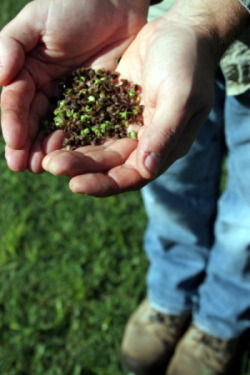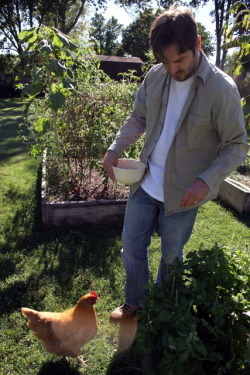 Photo: Kierstin CasellaThe first year that Jeremy planted his garden, I ruined it. My husband, a self-employed musician, had painstakingly raised tomato plants from tiny seeds bought at our local hardware store. He’d been envisioning a bountiful vegetable garden ever since we moved from our house near downtown Nashville to the smaller rural community of Kingston Springs.
Photo: Kierstin CasellaThe first year that Jeremy planted his garden, I ruined it. My husband, a self-employed musician, had painstakingly raised tomato plants from tiny seeds bought at our local hardware store. He’d been envisioning a bountiful vegetable garden ever since we moved from our house near downtown Nashville to the smaller rural community of Kingston Springs.
We had left behind an arts-minded, culturally mishmashed neighborhood close to our friends, hoping for a slower pace, a little more nature for our children to scamper through, and fewer police sirens. I couldn’t wait to restore the hundred-year-old farmhouse we’d bought and adorn it with all my flea market finds. I had visions of myself in a gingham apron pulling a steaming apple pie from the oven (even though I don’t bake), and spending weekends on the porch swing. Jeremy dreamt about a more self-sufficient way of life that connected him to his roots. He wanted chickens and a big organic garden to fill our acre lot.
To watch him doting over his seeds early that spring, one might have thought he was incubating a dozen fragile duck embryos on our window ledge. He adjusted their tray to make sure the sun hit them evenly, measured their water level, and peered in every hour to see if any hint of green had poked above the surface.
He hired a man to bring his tractor over and till an enormous rectangle smack in the center of our backyard. Had we filled it entirely, we’d have produced enough crops to open our own farmer’s market. Better to over-till than under-till, we figured. We were new to this whole practice of growing our own food, but my husband had claimed this as his new hobby and was going after it with great enthusiasm. Knowing how tirelessly he works, I supported the idea of a fun side project, especially one that yielded ingredients for spaghetti sauce.
 Photo: Kierstin CasellaFinally, the day arrived for him to carry his baby tomato plants into the real world. He laced up his work boots and ventured out toward the churned up dirt with a shovel and a thermos of lemon-lime Gatorade.
Photo: Kierstin CasellaFinally, the day arrived for him to carry his baby tomato plants into the real world. He laced up his work boots and ventured out toward the churned up dirt with a shovel and a thermos of lemon-lime Gatorade.
I can’t recall exactly what made me crack later that afternoon; it’s all a bit foggy. Possibly the early summer heat coupled with too much coffee caused my short temper. More likely, it’s because I was a few months pregnant with our second child, and trying in vain to keep our toddler from racing outside to hopscotch on an orderly row of heirloom tomato saplings.
All I remember is that at some point I marched, or maybe waddled, out to the center of the yard where Jeremy was planting, side-stepped a pot of basil, and lashed out at him in that mind-numbing, relentless way that wives, on occasion, do. And that was it. For him, the joy of the moment evaporated.
I knew pretty quickly that I’d just screwed up one of the rare moments of leisure my husband had hoped to steal for himself. In the weeks following, he mentioned his disappointment over that experience more than a few times. It surprised me a little since he’s not usually one to revisit old disagreements. Besides, the garden had begun flourishing, so I didn’t think I’d wrecked things entirely.
One evening, a few months later, he came into the living room where I sat watching TV and handed me something. “If you want to understand me better,” he said, “you should read this.” It was a sermon on why men are cultivators, warriors, and sages. Men love to create, it said, and once they've made something, they want to cultivate and nurture it, even if it fights against them.
Being both an artist and a mother, I quickly identified with these concepts of creating and nurturing. That part seemed plain enough, so I kept reading. As I skimmed the excerpt, I began to understand a little more of the challenges Jeremy faces in working and toiling. I began to see the garden in a new way, too. I remembered that afternoon of the tomato-planting and the frustration on his face over just wanting to reap something from all his labor, something good and pure for himself and his family without a dark cloud hanging over it.
So much of my husband’s day-to-day life is like this, though he seldom complains. There’s the self-propelled spinning of wheels in order to maintain his work. Concerts must be scheduled, financial obligations need to be met, and at the same time, he has kids wailing in the background, windows to replace, lawnmowers to fix, and gutters to clean in the middle of a rainstorm. Even our garden, despite his coaxing, is not quite Jefferson’s Monticello.
This year, an army of squash bugs set up camp in our zucchini plants and our sunflowers have begun to sag. Half the tomatoes have split open from the heat and get tossed to the chickens at dinnertime. The ground and weather aren’t always kind; both rebel against our desire for fresh food to enjoy and share with our neighbors.
 Photo: Kierstin Casella
Photo: Kierstin Casella
Still, we’ve experienced some victories. For two consecutive summers now, we’ve enjoyed juicy produce from steps beyond our door. We love that our son can run out to snip basil leaves or grab a clump of rosemary while I’m cooking. We’ve learned which varieties of tomatoes best work with our climate, and Jeremy made mental notes of which seeds to order next season. So although it often seems like a whole lot of time, sweat, and dirty fingernails for something costing a mere $2.49 a pound at the grocery store, deep down, I know it’s worth more than that.
 Photo: Kierstin Casella
Photo: Kierstin Casella
Just before sunset most weekdays, Jeremy finishes work in his home office and slips out the back door without anyone noticing. Sometimes I’ll see him through the kitchen window, corralling the hens back toward their coop with a long stick, or standing beyond a tangle of vines looking between the leaves for fruit that’s ready to pluck. He’ll appear in the kitchen awhile later looking happy, the hem of his T-shirt pulled up to make a bowl overflowing with ripe, red cherry tomatoes. Small though the harvest may be, he grew it from a little dried packet of practically nothing. He fought for it, and at the end of the day, it feeds our family. To us, it might as well be an abundant harvest.
 Photo: Kierstin Casella
Photo: Kierstin Casella
Kierstin Casella is an artist, writer, occasional photographer, and constant collector of anything with age. She resides in Tennessee with her husband, their two small children, and five feisty chickens that should begin laying eggs any minute now. You can also find Kierstin on her blog, a net for catching days.
















